Data Annotation Service Companies in the US (2026 Buyer’s Guide)

TL;DR
- We analyzed 12 leading data annotation service companies in the US trusted by ML teams.
- Each profile includes real pros and cons to support vendor shortlisting.
- Companies are compared on accuracy, scalability, compliance, communication, and pricing transparency.
- You'll see clear differences between service-first vendors and hybrid platform providers.
- Includes insights to help you decide whether to outsource or build an in-house team.
How Top Data Labeling Companies Compare in 2025
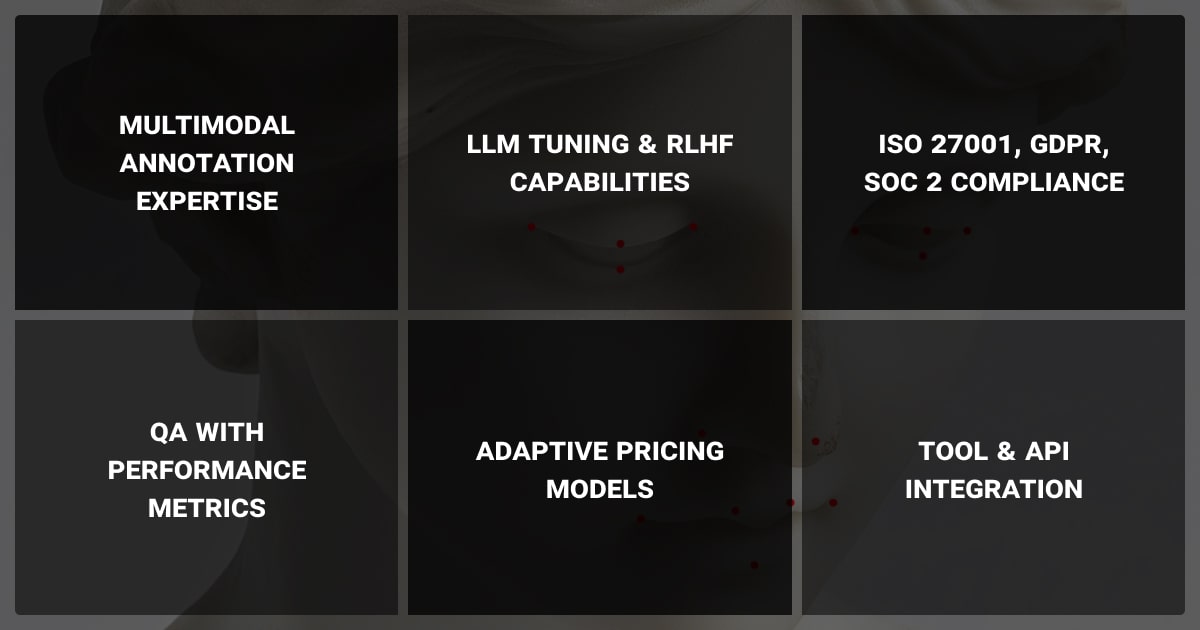
If you’ve tried managing data annotation in-house, you probably already know how messy it gets. The quality fluctuates. Guidelines keep changing. Review cycles stretch into weeks. And no one wants to QA bounding boxes at 2am — not even your most enthusiastic intern.
So teams outsource to a data annotation company. Not because they can’t do it, but because they don’t want to waste weeks doing something that pulls focus from shipping a working model.
This guide compares 12 data annotation service companies in the US. Some provide full-service annotation. Others focus on tooling or hybrid workflows. Each has different strengths, and choosing the right partner depends on what you’re building.
We looked at:
- What they’re actually good at (CV, NLP, audio, video, multimodal)
- How scalable they are when your data suddenly triples
- How clearly they communicate, especially under deadline pressure
- Whether they’re secure enough for regulated work (think HIPAA, SOC 2)
- How pricing works and whether it’s transparent or… not
Not every vendor here is right for every team. Let’s break them down, one by one.
Want a more detailed framework for evaluating vendors? Get your copy of The Buyer’s Guide to Data Labeling Vendors before making your shortlist.
Label Your Data
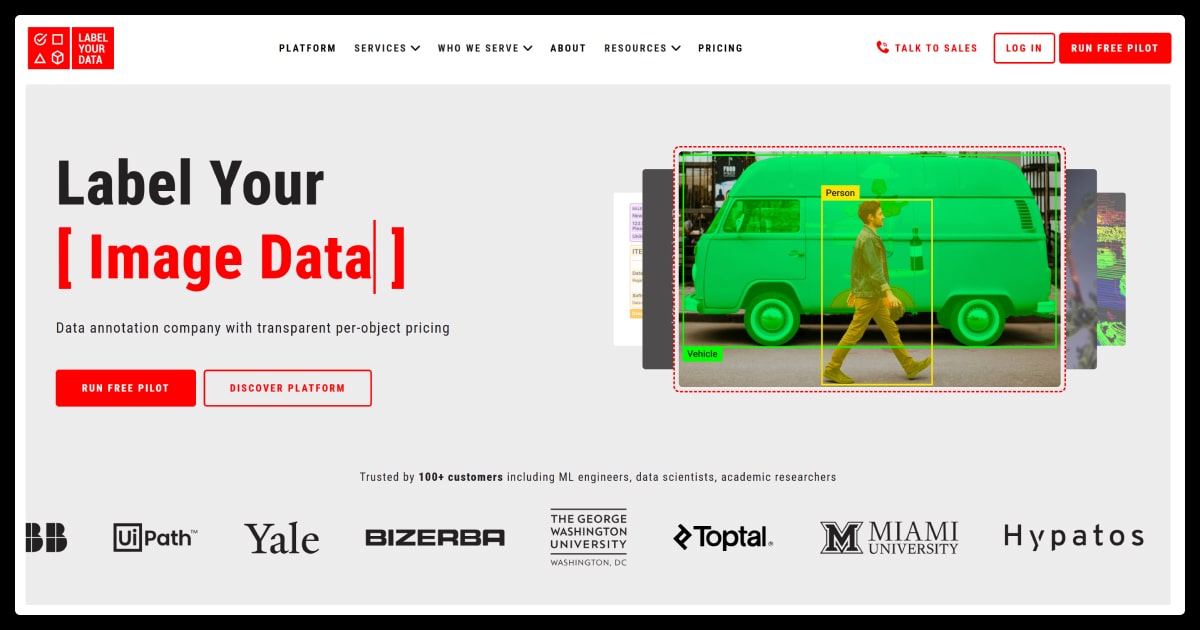
We provide fully managed data annotation services for teams who need training data without the drag of doing it in-house. Our data annotation platform supports computer vision annotation with a QA process that keeps accuracy above 98%. You’ll get tool-agnostic output, secure workflows (HIPAA, ISO 27001, PCI DSS), and real support from people who’ve handled everything from surgical videos to bank documents.
Pros of Label Your Data
- Multimodal annotation support (image, video, text, audio, 3D point cloud data)
- Tool-agnostic output compatible with any pipeline
- 98%+ accuracy with human QA baked in
- Certified for PCI DSS, ISO 27001, GDPR, CCPA, and HIPAA
- Industry experience across automotive, healthcare, geospatial, e-commerce, and more
- No lock-in: pay per object or per hour
- Built-in features: uploads, pricing estimates, API, and free pilot offer
Try our cost calculator to get rough data annotation pricing for your project.
Cons of Label Your Data
- CV-first platform, NLP and audio annotation tasks are handled via services
- Currently, not designed for teams looking to fully automate labeling
Read the full Label Your Data company review for more.
From my experience building data annotation systems, the biggest mistake I see is not implementing automated quality checks from day one. I once had to re-annotate 50,000 images because of inconsistent labeling. I recommend starting with a small pilot project and using random sampling to verify at least 10% of the work before scaling up the operation.
iMerit
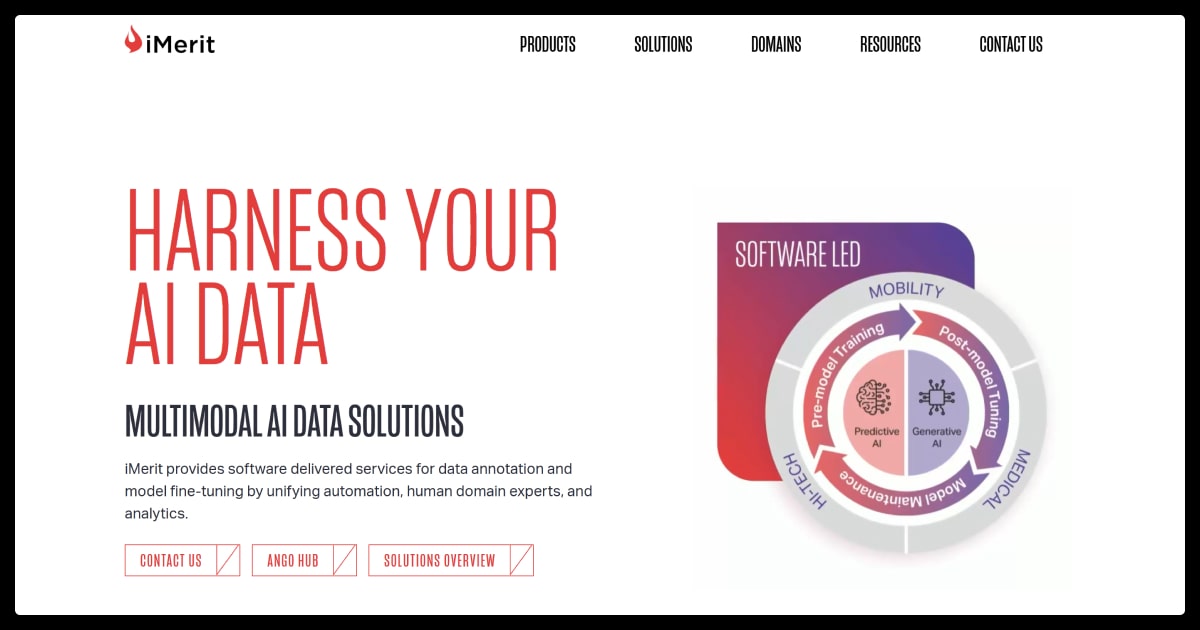
iMerit is a service-first data annotation company with a strong focus on high-precision labeling in healthcare, autonomous systems, and geospatial AI. They offer in-house teams trained for complex tasks like medical imaging, LiDAR, and satellite data, and support it with a proprietary platform (Ango Hub). If you’re evaluating vendors for quality-sensitive use cases, this iMerit review highlights where they fit best.
Pros of iMerit
- Specialization in complex domains like medical, AV, and mapping
- End-to-end human-in-the-loop service with strong QA practices
- Workforce development model supporting teams in emerging markets
- ISO 27001 and SOC 2 certified for enterprise and healthcare compliance
- Platform access (Ango Hub) available for workflow visibility and review
Cons of iMerit
- Slower project starts due to team setup and domain-specific onboarding
- Not ideal for smaller or fast-turnaround jobs
- May be less flexible on short-term scope changes or experimental tasks
Appen
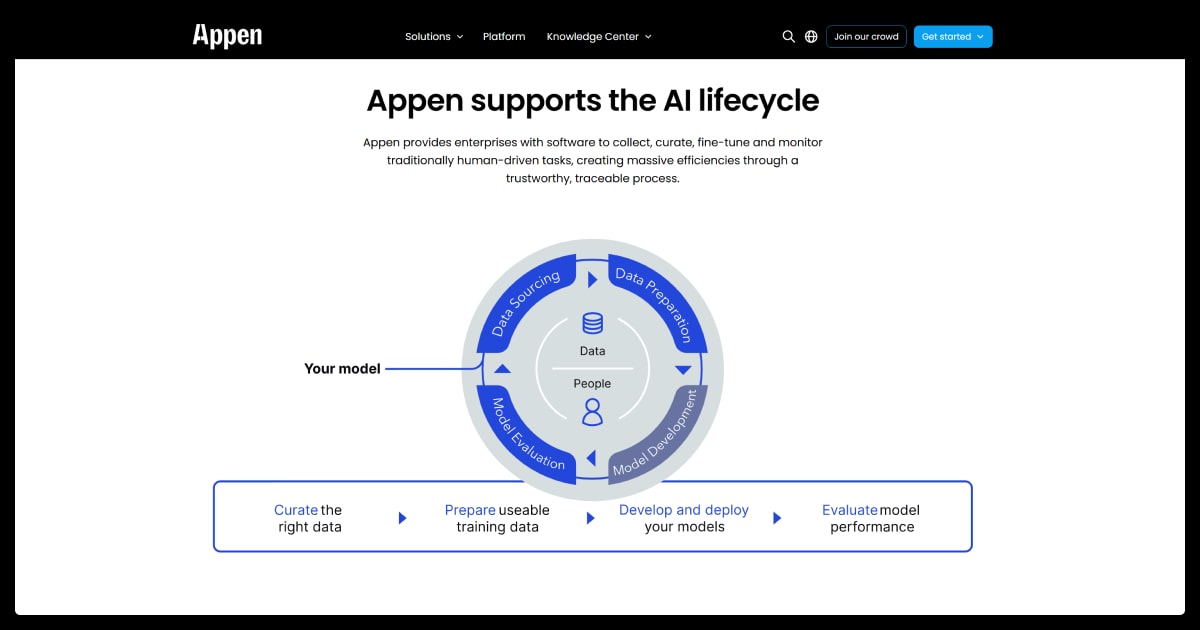
Appen is a large-scale data annotation provider best known for its global crowd workforce and multi-language coverage. Their model relies on remote annotators across 170+ countries, combined with platform tools, to handle high-volume CV, NLP, and speech projects. Most clients are large enterprises with multilingual or region-specific requirements. You can read this Appen review to see where they fit in.
Pros of Appen
- Global workforce with coverage across 170+ countries
- Multi-modal services: text, speech, image, video
- Scales well for large, enterprise-grade projects
- Experienced with multilingual NLP projects across 235+ languages
Cons of Appen
- Quality can vary due to distributed workforce
- Pricing can spike at scale, especially for QA-heavy tasks
- Limited flexibility for teams needing custom annotation logic
- QA process is less visible compared to service-first vendors
Keymakr
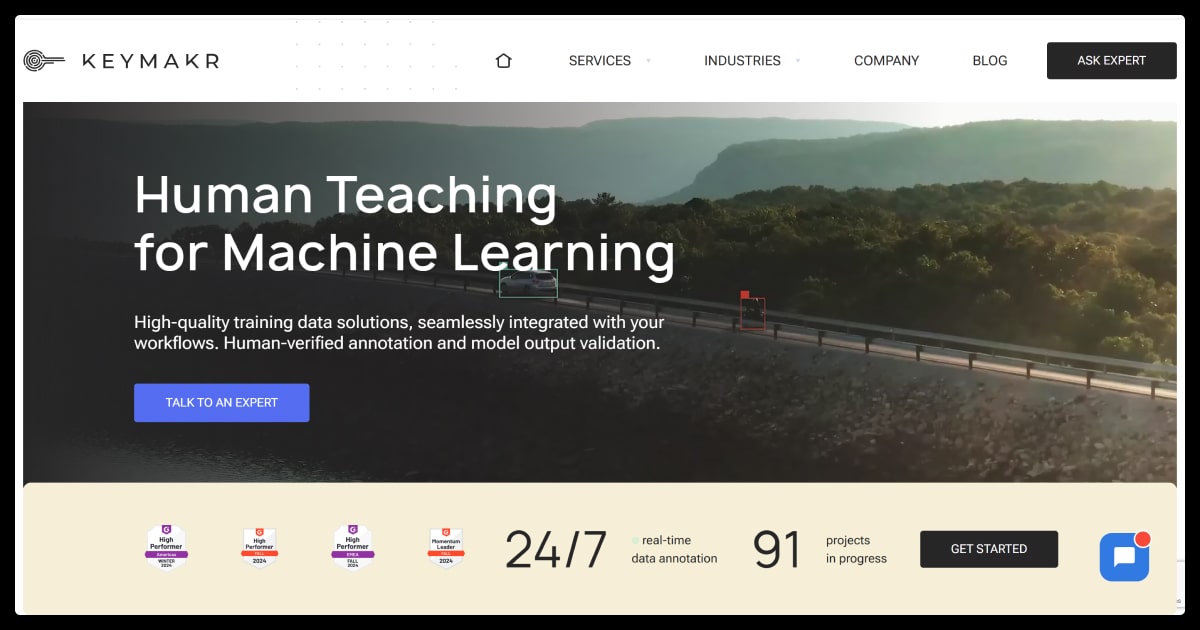
Keymakr is a service-first data annotation provider specializing in high-quality image and video labeling. They combine a proprietary platform, Keylabs, with a trained in-house annotation team to deliver precise datasets for computer vision applications. Their services cater to industries like automotive, healthcare, robotics, and more.
Pros of Keymakr
- Proprietary platform (Keylabs) supporting various annotation types
- In-house team of over 600 trained annotators
- Four-tier quality assurance process for high accuracy
- Experience across multiple industries, including medical and automotive
- Offers data collection and creation services for custom datasets
Cons of Keymakr
- Platform interface may have a learning curve for new users
- Less suitable for projects requiring rapid scalability or automation
Scale AI
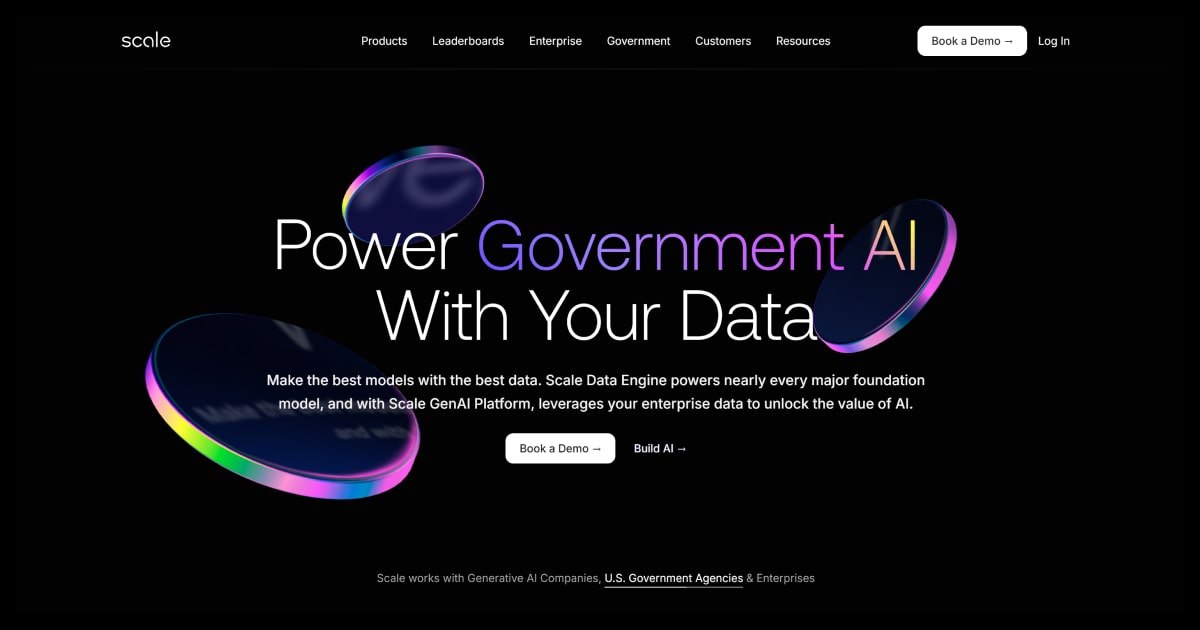
Scale AI is a hybrid data annotation provider combining ML automation with human-in-the-loop workflows. Their platform supports a range of data types, including text, images, video, and 3D sensor data, catering to industries such as autonomous vehicles, healthcare, and defense. Notably, Scale AI has collaborated with organizations like OpenAI and the U.S. Department of Defense.
Pros of Scale AI
- Rapid turnaround times for large-scale annotation projects
- Integration of machine learning tools with human oversight for enhanced accuracy
- Support for multi-modal data types, including 3D sensor fusion
- Experience with high-profile clients in various sectors
Cons of Scale AI
- Premium pricing may be a consideration for some projects
- Less transparent QA processes compared to service-first vendors
- Potential limitations in customization for specific annotation workflows
For a more detailed analysis, refer to our Scale AI company review.
Many teams assume NDAs are enough to protect sensitive data, but the real mistake is overlooking the provider’s security practices. Make sure they use encryption, strict access controls, and comply with standards like HIPAA. You're handing over your data — verify that they’re equipped to protect it.
SuperAnnotate
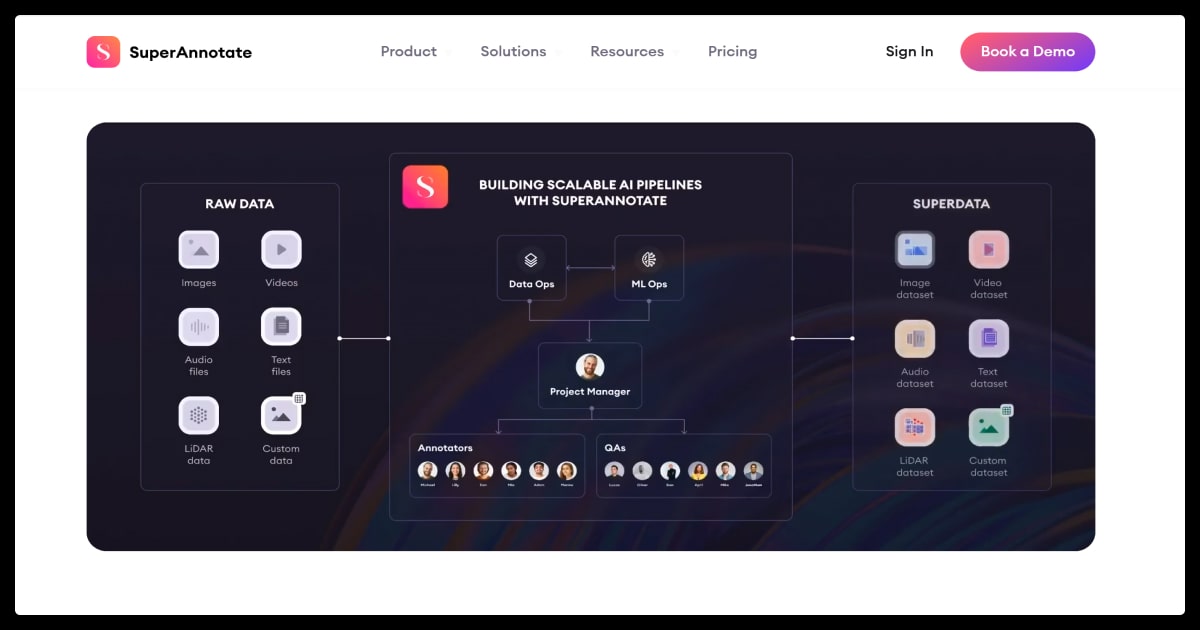
SuperAnnotate is a hybrid data annotation provider offering a comprehensive platform combined with managed annotation services. The platform supports various data types such as images, videos, text, audio, and 3D point cloud data. SuperAnnotate also provides tools for project management, QA, and automation to streamline the annotation process.
Pros of SuperAnnotate
- Supports a wide array of data types
- Offers both a platform and managed annotation services
- Provides tools for project management, QA, and automation
- Suitable for various industries, including autonomous driving, healthcare, and robotics
Cons of SuperAnnotate
- Platform may have a learning curve for new users
- Some advanced features may require additional setup and configuration
For a more detailed analysis, refer to our SuperAnnotate review.
CogitoTech
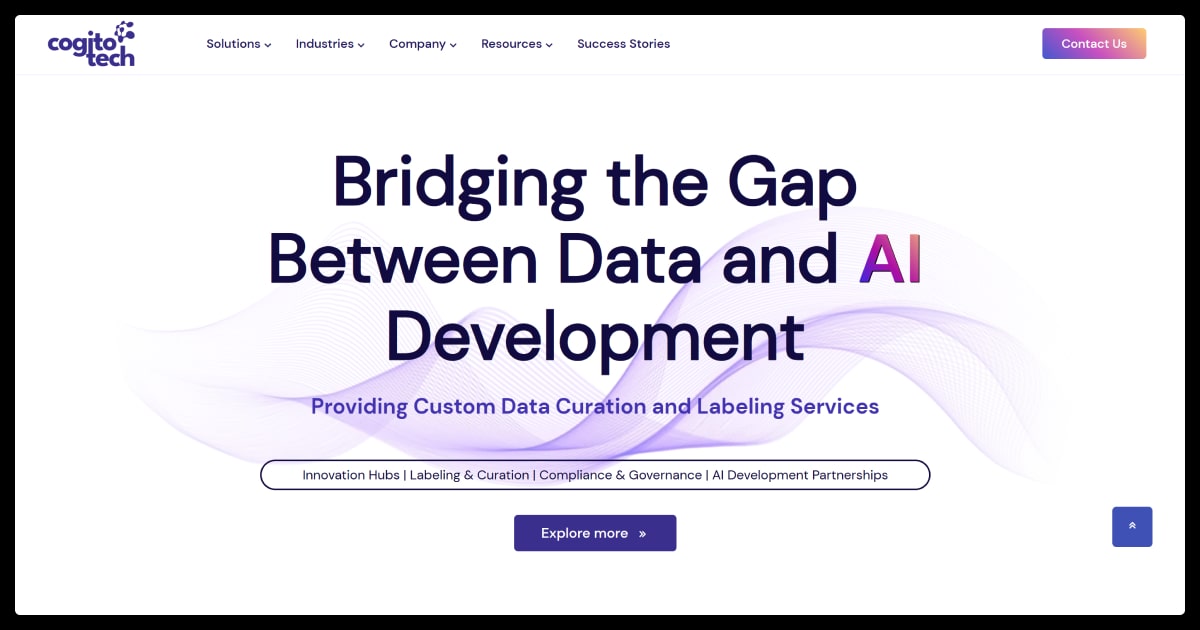
CogitoTech is a service-first annotation provider focused on precision work across regulated and high-risk domains. They’re known for strict QA processes, ethical sourcing practices, and long-term experience with clients in healthcare, automotive, and finance. Their services cover image, video, text, and audio — with a strong emphasis on privacy and compliance.
Pros of CogitoTech
- Certified for ISO 27001, HIPAA, and SOC 2 Type II
- Deep vertical experience in healthcare, automotive, and financial services
- Prioritizes ethical data sourcing with multi-stage QA
Cons of CogitoTech
- May not scale quickly for high-volume projects
- Platform UI and onboarding process can be slower for first-time users
Labelbox
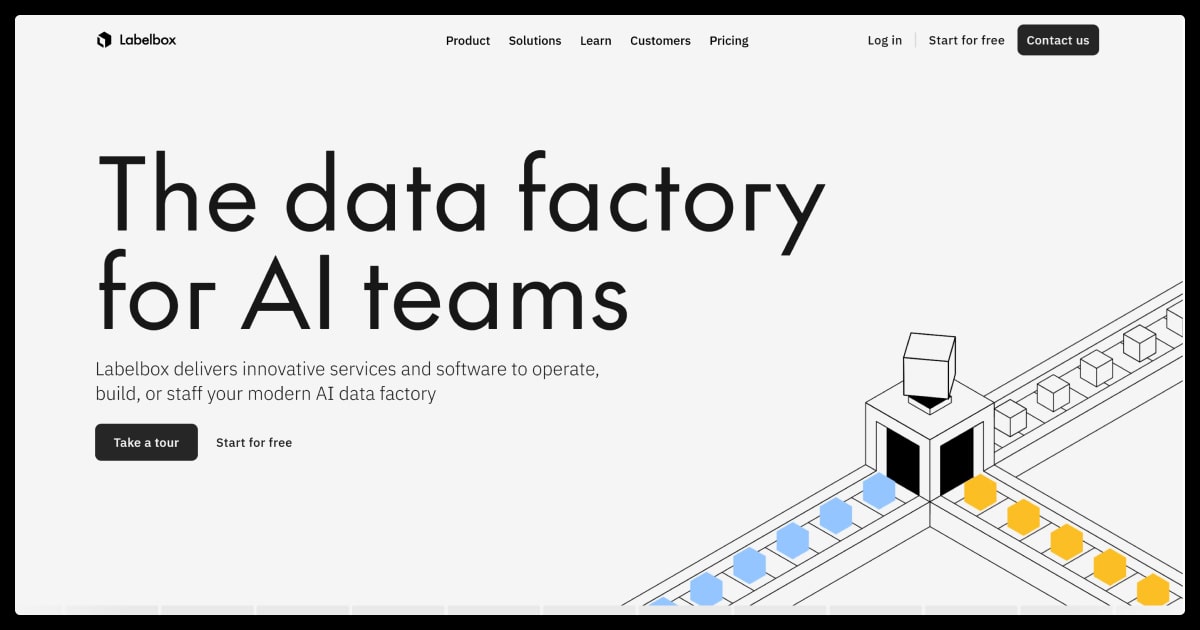
Labelbox is a hybrid provider offering both a full-featured annotation platform and optional labeling services. It’s built for teams that want hands-on control, with support for CV, NLP, and 3D data. The platform is commonly used by in-house ML teams looking to manage workflows, integrate with cloud storage, and speed up projects using automation.
Pros of Labelbox
- Supports images, video, text, audio, and 3D data
- Enables custom workflows and model-assisted labeling
- Includes collaboration tools and cloud storage integrations
- Scales from startup use cases to enterprise-level pipelines
Cons of Labelbox
- Platform has a learning curve for new users
- Feature complexity can slow teams without technical support
- Pricing may be high for smaller projects
Labeller
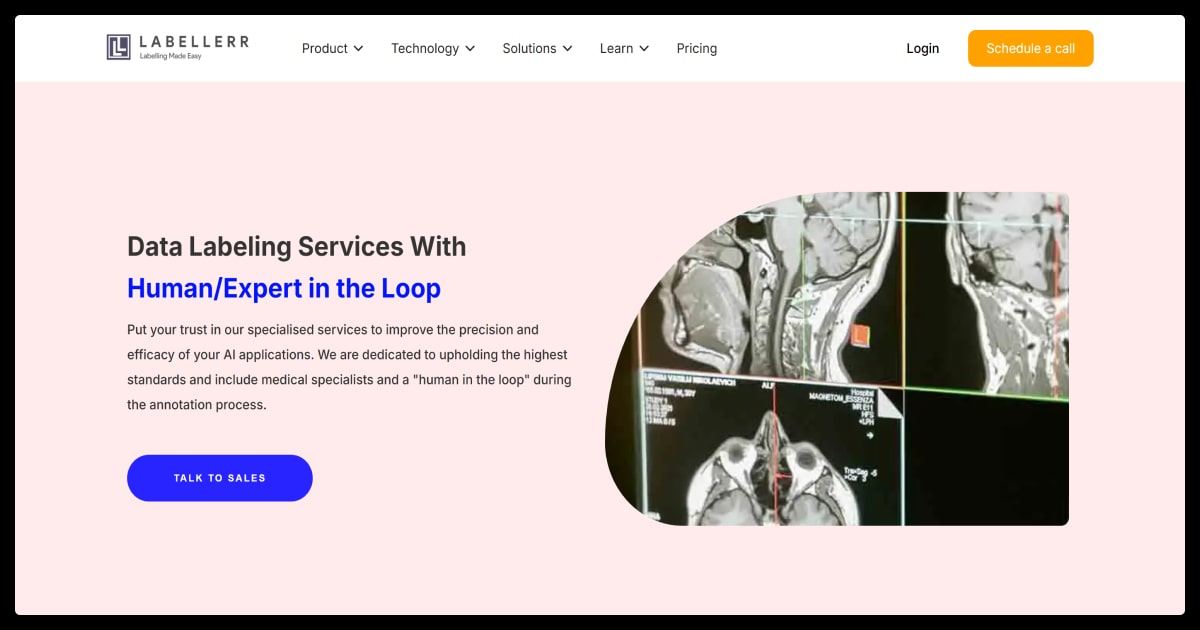
Labellerr offers a hybrid data annotation solution that combines an AI-powered platform with managed services. Their platform supports various data types, including images, videos, text, audio, and PDFs, catering to industries such as automotive, healthcare, retail, and agriculture. Labellerr emphasizes automation, providing features like pre-labeling and a smart feedback loop to enhance efficiency.
Pros of Labeller
- Supports multiple data types: images, videos, text, audio, and PDFs
- Offers AI-assisted labeling features, including pre-labeling and smart feedback loop
- Caters to diverse industries such as automotive, healthcare, retail, and agriculture
- Provides both a platform and managed annotation services
- Recognized as a G2 2024 Spring High Performer and Easiest To Use in Data Labeling Software
Cons of Labeller
- Platform may have a learning curve for new users
- Advanced features might require additional setup and configuration
CloudFactory
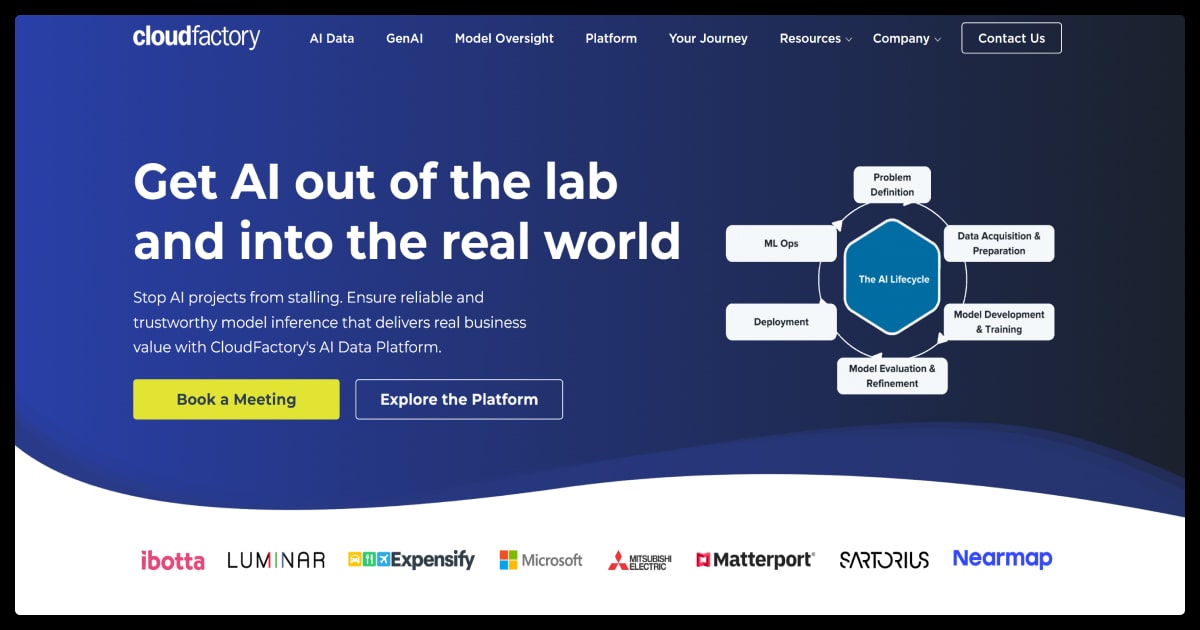
CloudFactory is a service-first data annotation provider that combines a managed workforce with an AI-assisted platform. They specialize in human-in-the-loop (HITL) solutions for computer vision and NLP tasks, supporting industries like healthcare, retail, and finance. With a global team of over 7,000 trained data analysts, CloudFactory emphasizes scalability, quality, and social impact in its operations.
Pros of CloudFactory
- Supports diverse data types, including images, videos, text, and audio
- Combines AI-assisted tools with a managed human workforce for HITL solutions
- Offers flexible scaling options to accommodate varying project sizes
- Emphasizes social impact by providing employment opportunities in developing countries
- Maintains compliance with standards like ISO 27001 and SOC 2
Cons of CloudFactory
- May have longer onboarding times due to workforce training requirements
- Platform interface might require a learning curve for new users
Check our CloudFactory review for a more detailed analysis.
One major risk is failing to define what ‘good’ looks like from the start. Without clear quality criteria, you’ll end up with inconsistent data that slows everything down. During my time at Adobe, alignment across teams and tech was non-negotiable. Set expectations early and revisit them often as projects evolve.
V7
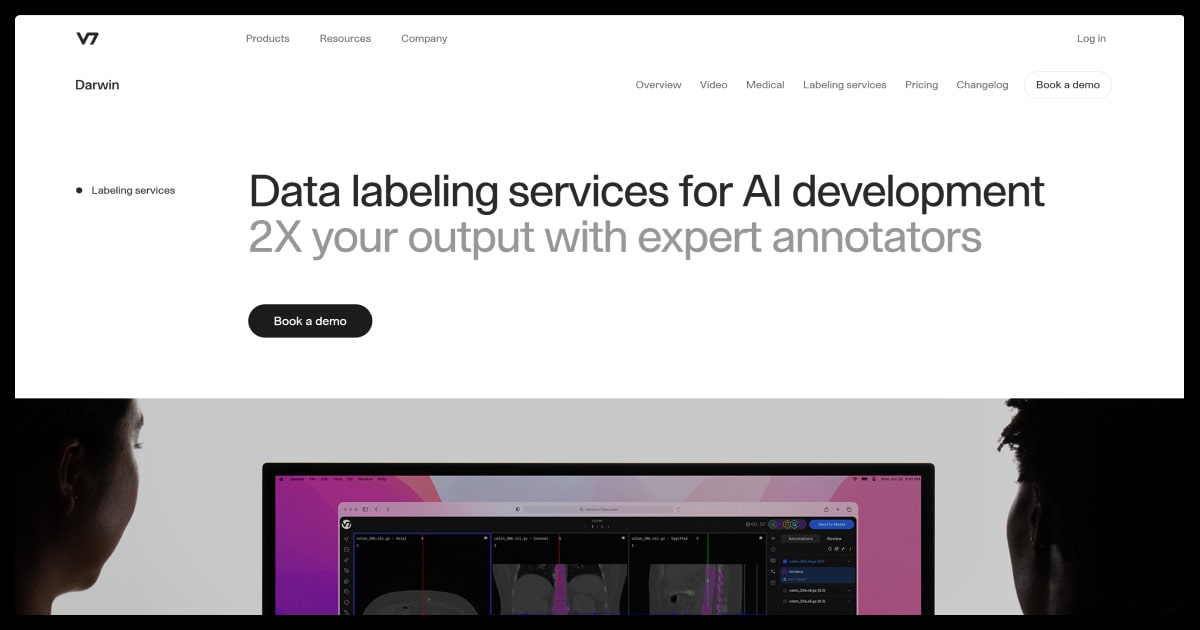
V7 is a hybrid data annotation provider offering an AI-powered platform with optional managed services. It's built for teams working on computer vision and generative AI projects, supporting data types like images, videos, and documents. The platform includes features such as AI-assisted labeling, customizable workflows, and integrations with cloud storage solutions.
Pros of V7
- Supports images, videos, and documents
- Offers AI-assisted labeling tools like Auto-Annotate and SAM2
- Provides customizable workflows and real-time collaboration features
- Integrates with cloud storage solutions like AWS, GCP, and Azure
- Complies with standards like GDPR, HIPAA, and SOC 2
Cons of V7
- Limited support for audio and geospatial data types
- Advanced features may require a learning curve for new users
- Performance can vary depending on the complexity of tasks
Sama
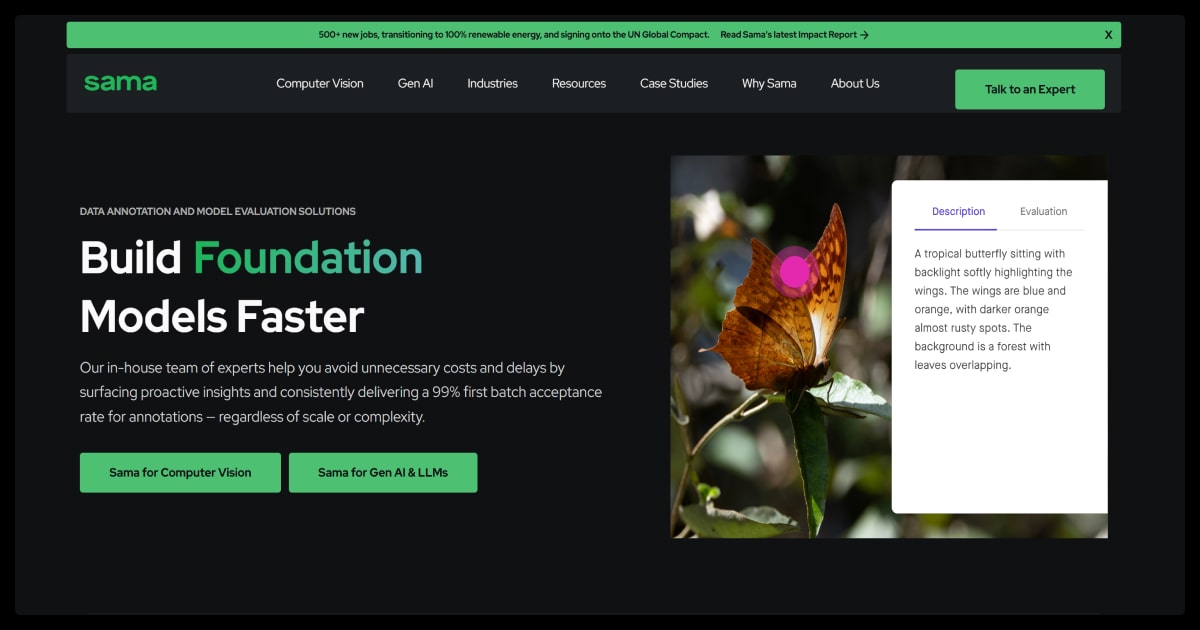
Sama is a service-first data annotation provider specializing in computer vision tasks. Their platform supports image, video, and 3D point cloud data, catering to industries like automotive, retail, and manufacturing. With a focus on quality assurance and scalability, Sama combines human expertise with AI-assisted tools to deliver accurate annotations.
Pros of Sama
- Supports images, videos, and 3D point clouds
- Combines human expertise with AI-assisted tools for efficient annotation
- Offers scalability for large datasets and complex projects
- Emphasizes quality assurance with multi-step validation processes
- Provides services across various industries, including automotive, retail, and manufacturing
Cons of Sama
- Limited support for natural language processing tasks
- Pricing may be higher compared to other providers
- Potential concerns regarding labor practices in certain regions
For a more detailed analysis, read our Sama company review.
How to Choose Between Data Annotation Companies for Your Project
No single vendor is a perfect fit for every team. The right choice depends on your data types, deadlines, internal capacity, and security needs.
Here’s a quick breakdown:
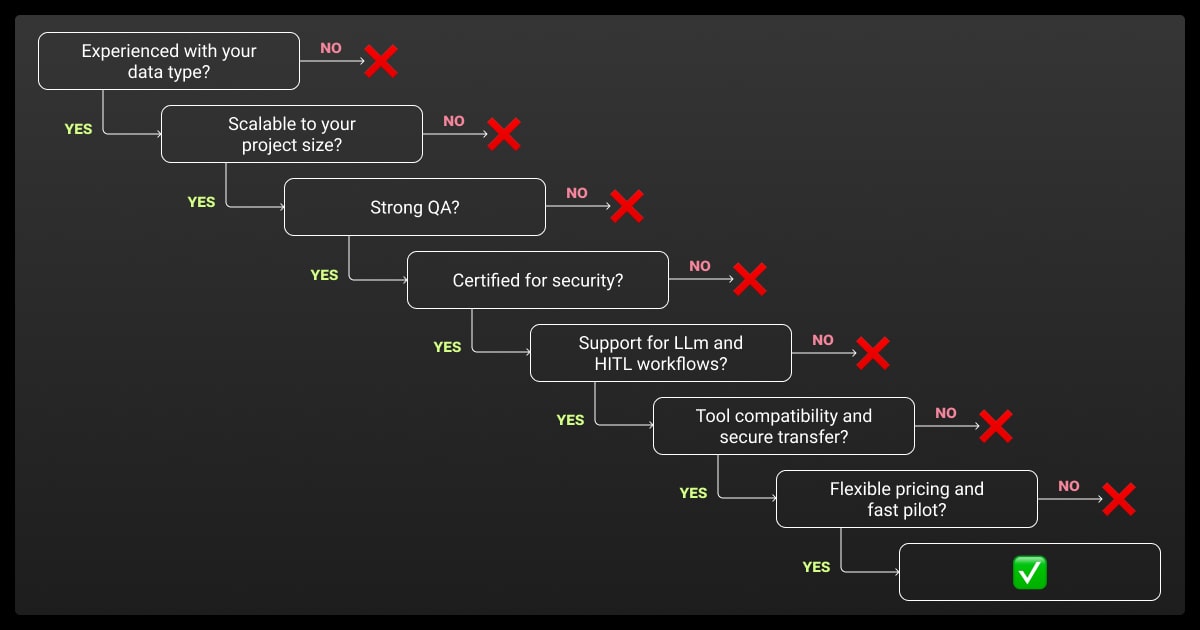
Still deciding between in-house vs. outsourcing data annotation? Read The Guide to In-House Data Labeling to weigh the tradeoffs and build a plan that fits.
About Label Your Data
If you choose to delegate data annotation, run a free data pilot with Label Your Data. Our outsourcing strategy has helped many companies scale their ML projects. Here’s why:
Check our performance based on a free trial
Pay per labeled object or per annotation hour
Working with every annotation tool, even your custom tools
Work with a data-certified vendor: PCI DSS Level 1, ISO:2700, GDPR, CCPA
FAQ
What is a data annotation company?
A data annotation company labels datasets (images, text, audio, or video) to train and evaluate machine learning models. Some offer fully managed services with human QA, while others provide platforms to manage the work yourself.
What should I look for when choosing a data annotation service company?
Look for task expertise (CV, NLP, 3D, etc.), quality assurance processes, and secure infrastructure (HIPAA, ISO 27001). Check whether they offer LLM support, automation tools, or API access, especially if you're managing data pipelines. Pricing transparency and the ability to scale quickly matter, too. Bonus points if they offer a free pilot to test fit.
How much do data annotation companies usually charge?
Typical rates range from $0.02–$0.09 per object for CV tasks, or $6–$12/hour for managed teams. NLP pricing may use per-character or per-entity rates. Platforms often charge monthly or usage-based fees.
Which data labeling companies offer a free pilot?
Label Your Data, CloudFactory, and SuperAnnotate offer free pilots or test projects. Scale AI provides a trial through Scale Rapid. Availability may vary, so always confirm during onboarding.
Written by
Karyna is the CEO of Label Your Data, a company specializing in data labeling solutions for machine learning projects. With a strong background in machine learning, she frequently collaborates with editors to share her expertise through articles, whitepapers, and presentations.





